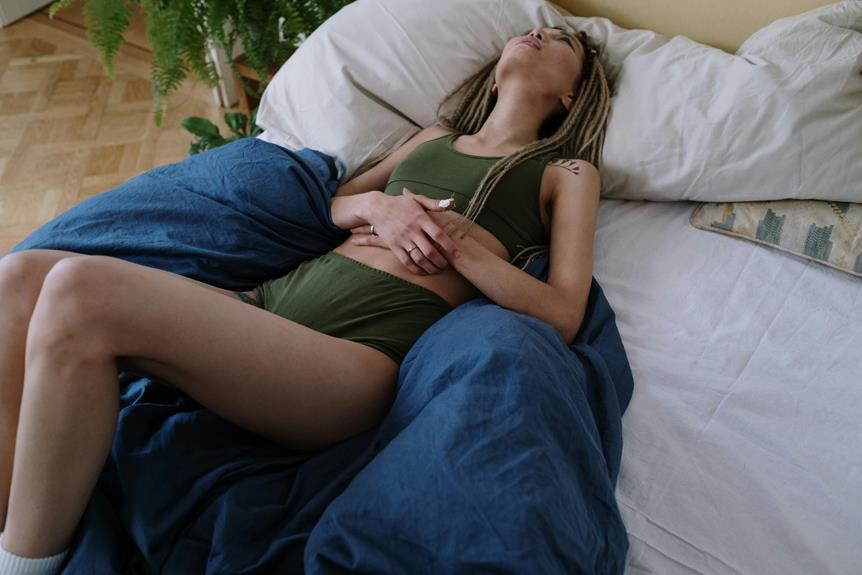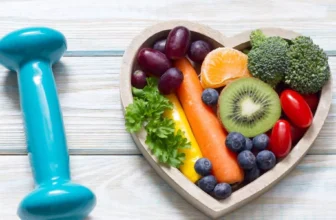
If you find yourself seeking relief from period pain, exploring natural remedies might offer you a new perspective on managing discomfort. Consider this – what if there were simple, accessible ways to alleviate those cramps and mood swings without relying heavily on medications? By incorporating a few key practices into your routine, you might discover a holistic approach that not only eases physical symptoms but also enhances your overall well-being.
Dietary Changes
Consider making dietary changes to alleviate period pain. Your diet plays a significant role in managing menstrual discomfort.
Start by increasing your intake of foods rich in omega-3 fatty acids, such as salmon, chia seeds, and walnuts. These foods can help reduce inflammation and ease cramps. Additionally, incorporating more fruits and vegetables into your meals can provide essential vitamins and minerals that support overall reproductive health.
Limiting your consumption of processed foods, sugary snacks, and caffeine can also make a difference. These items can exacerbate bloating and discomfort during your period. Instead, opt for whole foods like lean proteins, whole grains, and legumes to maintain stable blood sugar levels and energy throughout the day.
Staying hydrated is crucial for managing period symptoms. Drinking plenty of water can help reduce bloating and alleviate headaches commonly associated with menstruation. Herbal teas, such as chamomile or ginger tea, can also have a soothing effect on your body.
Herbal Remedies
To explore natural ways to alleviate period pain further, herbal remedies can be a beneficial option to consider. Many women find relief from menstrual cramps by using herbs known for their anti-inflammatory and pain-relieving properties.
One commonly used herb is ginger, which can help reduce muscle cramping and inflammation. You can brew ginger tea or take ginger supplements to potentially ease your period discomfort.
Another herb to consider is cinnamon, which may help with reducing menstrual pain due to its anti-inflammatory effects. Adding cinnamon to your diet or taking it as a supplement might offer some relief during your period.
Additionally, chamomile tea has calming properties that can help relax the muscles and alleviate cramps. Drinking chamomile tea throughout the day can be soothing and may help decrease the intensity of your period pain.
Remember to consult with a healthcare provider or herbalist before trying herbal remedies to ensure they're safe for you.
Mind-Body Practices
Engage in mind-body practices to help alleviate period pain naturally. Techniques like yoga, meditation, and deep breathing can be powerful tools in managing discomfort during your menstrual cycle.
Yoga poses that focus on gentle stretching and relaxation, such as child's pose or cat-cow pose, can help relieve tension in your pelvic area and lower back, easing period cramps. Additionally, practicing mindfulness meditation can assist in reducing stress and promoting relaxation, which may ultimately lead to decreased pain perception.
Deep breathing exercises, like diaphragmatic breathing or alternate nostril breathing, can also be beneficial in calming your nervous system and reducing muscle tension, potentially easing the intensity of period pain. By incorporating these mind-body practices into your routine, you can create a sense of inner calm and better cope with the discomfort that often accompanies menstruation.
Physical Activity
Explore how incorporating physical activity into your routine can also help alleviate period pain naturally. Engaging in moderate exercise during your menstrual cycle can release endorphins, which are the body's natural painkillers, helping to reduce discomfort. Activities like walking, swimming, or gentle yoga can improve blood circulation and relax your muscles, easing cramps and tension. Aim for at least 30 minutes of physical activity most days of the week to experience the benefits.
Regular movement can also help regulate hormone levels, potentially leading to lighter and shorter periods. Additionally, staying active can boost your mood and energy levels, counteracting the fatigue and mood swings often associated with menstruation. Remember to listen to your body and choose activities that feel good to you. If you experience severe pain, opt for low-impact exercises and consult with a healthcare provider if needed.




